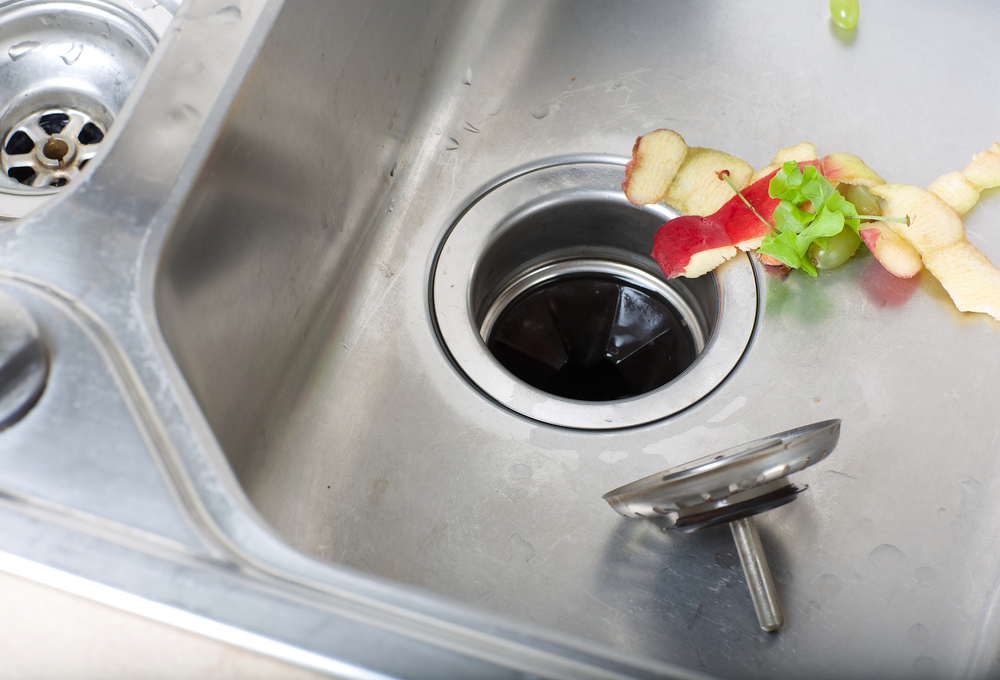Garbage disposals are a vital appliance in any kitchen, designed to grind up food waste and prevent clogs in your pipes. Understanding how they work can help you identify when it’s time for a replacement.
A garbage disposal consists of a motor, a shredding chamber, and a flywheel. When you turn on the disposal, the motor spins the flywheel, which in turn spins the shredding blades. As food waste is fed into the disposal, the blades chop it up into small particles, which are then flushed down the drain.
The shredded waste is carried through the pipes and ultimately ends up in the sewer system or septic tank. This process not only saves you from having to scrape food scraps into the trash but also helps prevent foul odors and pests in your kitchen.
Despite their durability, garbage disposals have a limited lifespan. Over time, the blades can become dull, the motor can wear out, and the overall efficiency of the unit can decrease. Recognizing the signs that indicate it’s time for a replacement can save you from costly repairs and frustrating breakdowns.
Common Problems with Garbage Disposals
Garbage disposals, like any appliance, can experience a range of issues that affect their performance. Understanding these common problems can help you identify whether it’s time to replace your garbage disposal.
One of the most noticeable signs of a failing garbage disposal is strange noises or a foul odor. If your disposal is making grinding or rattling sounds, it may be a sign that the blades are worn out or loose. Additionally, a foul odor emanating from your disposal could indicate a buildup of food particles or bacteria that can no longer be effectively removed.
Frequent clogging or slow draining is another indication that your garbage disposal may be on its last legs. If you find yourself constantly having to plunge your sink or call a plumber to clear clogs, it’s time to consider a replacement. These issues can be caused by a variety of factors, including worn-out blades, a malfunctioning motor, or inadequate power.
Leaks or excessive vibration are also warning signs that your garbage disposal is past its prime. Leaks can occur at the connection points or within the unit itself, and they can lead to water damage and mold growth if left untreated. Excessive vibration, on the other hand, can indicate a misalignment of the motor or blades, which can cause further damage if not addressed promptly.
Signs That Indicate It’s Time to Replace Your Garbage Disposal
Now that we’ve explored some of the common problems with garbage disposals, let’s delve into the five signs that indicate it’s time to replace your unit.
- Strange Noises and Foul Odor: If your garbage disposal is making grinding, rattling, or clanking noises, or if it emits a persistent foul odor, it’s likely time for a new unit. These signs indicate that the blades are worn out or loose, and the disposal is no longer operating efficiently.
- Frequent Clogging or Slow Draining: Constantly dealing with clogs or slow drainage is a clear indication that your garbage disposal is on its last legs. Whether it’s due to dull blades, a malfunctioning motor, or inadequate power, a replacement is necessary to restore proper functionality.
- Leaks and Excessive Vibration: Leaks and excessive vibration can lead to further damage if not addressed promptly. If you notice water pooling under your sink or feel excessive shaking when your disposal is running, it’s time to invest in a new unit to avoid potential water damage and costly repairs.
- Constantly Tripping the Circuit Breaker: If your garbage disposal frequently trips the circuit breaker, it could be a sign that the motor is drawing too much power or is malfunctioning. This can be a safety hazard and indicates that a replacement is needed to prevent electrical issues.
- Age: Garbage disposals typically have a lifespan of around 10 to 15 years. If your unit is older than this, it’s likely not as efficient as newer models and could be costing you more in energy consumption. Upgrading to a new, more energy-efficient garbage disposal can save you money in the long run.
The Importance of Hiring a Professional Plumber for Garbage Disposal Replacement
Replacing a garbage disposal may seem like a straightforward task, but it’s essential to hire a professional plumber for the job. Here’s why:
- Expertise: Professional plumbers have the knowledge and experience to properly assess your specific needs and recommend the right garbage disposal for your kitchen. They can ensure that the new unit is compatible with your plumbing system and meets your requirements.
- Safety: Garbage disposals involve electrical connections and plumbing work, both of which can be hazardous if not handled correctly. A professional plumber will follow the necessary safety protocols and ensure that the installation is done safely and up to code.
- Efficiency: Hiring a professional plumber can save you time and effort. They have the necessary tools and expertise to complete the installation efficiently, minimizing any disruptions to your daily routine.
- Warranty: Many garbage disposals come with warranties that require professional installation for the warranty to remain valid. By hiring a professional plumber, you ensure that your investment is protected should any issues arise.
How to Choose the Right Garbage Disposal for Your Needs
Choosing the right garbage disposal for your kitchen requires considering several factors. Here are some key points to keep in mind:
- Size and Power: Garbage disposals come in various sizes and power capacities. Consider the amount of food waste generated in your household and choose a unit that can handle your needs. A larger family may require a more powerful disposal to prevent clogs and ensure efficient operation.
- Noise Level: Some garbage disposals are designed to operate quietly, while others can be quite noisy. If noise is a concern for you, look for models that are specifically marketed as quiet or have noise-reducing features.
- Durability: Look for garbage disposals made from durable materials that can withstand the demands of daily use. Stainless steel components, for example, are known for their durability and resistance to corrosion.
- Features: Consider any additional features that may enhance your experience, such as anti-jamming technology, overload protection, or easy installation mechanisms. These features can make your garbage disposal more convenient and user-friendly.
- Brand Reputation: Research different brands and read customer reviews to gauge their reputation for quality and reliability. Choosing a reputable brand can give you peace of mind knowing that you’re investing in a reliable and long-lasting product.
The Installation Process of a New Garbage Disposal
While it’s recommended to hire a professional plumber for garbage disposal installation, understanding the general process can help you make informed decisions and communicate effectively with your plumber. Here’s a step-by-step overview of the installation process:
- Turn Off Power: Before starting any work, ensure that the power to the disposal is turned off. Locate the circuit breaker or switch that controls the disposal and switch it off for safety.
- Disconnect Old Disposal: Disconnect the old garbage disposal from the mounting bracket, drainpipe, and electrical connections. Follow the manufacturer’s instructions or consult a professional plumber for guidance.
- Prepare Mounting Bracket: If your new garbage disposal comes with a mounting bracket, attach it securely to the bottom of the sink with the provided hardware. Ensure that it is level and properly aligned.
- Attach New Disposal: Lift the new garbage disposal and align it with the mounting bracket. Rotate it clockwise until it locks into place. Follow the manufacturer’s instructions for specific installation details.
- Connect Drainpipe: Connect the drainpipe to the disposal by aligning the rubber gasket and tightening the metal ring or clamp. Ensure that all connections are secure to prevent leaks.
- Connect Electrical Wiring: If your new disposal requires electrical connections, follow the manufacturer’s instructions and local electrical codes. Ensure that the wiring is properly connected and secure.
- Test and Check for Leaks: Turn the power back on and run water into the disposal to check for any leaks. Test the disposal by running it with water and food waste to ensure proper functionality.
- Dispose of Old Unit: Properly dispose of the old garbage disposal according to local regulations. Many recycling centers accept old appliances, or you can contact your local waste management facility for guidance.
Remember, these steps are for general guidance only. It’s always best to consult a professional plumber for specific instructions and to ensure a safe and proper installation.
Maintenance Tips for Extending the Lifespan of Your Garbage Disposal
To maximize the lifespan and efficiency of your garbage disposal, regular maintenance is crucial. Follow these simple tips to extend the life of your unit:
- Clean Regularly: Keep your garbage disposal clean by regularly flushing it with water and a mild dish detergent. This helps remove food particles and bacteria that can cause odors and clogs.
- Avoid Hard Items: Avoid disposing of hard items like bones, fruit pits, or shells, as they can damage the blades or jam the unit. Instead, opt for softer food waste that can be easily ground up.
- Run Cold Water: When using your garbage disposal, always run cold water to help solidify any grease or fat, making it easier to flush down the drain. Hot water can melt fats, causing them to solidify further down the pipes and potentially lead to clogs.
- Grind Citrus Peels: Grinding citrus peels can help freshen the disposal and eliminate odors. The natural oils in the peels can also help clean and disinfect the unit.
- Avoid Chemical Drain Cleaners: Chemical drain cleaners can corrode the components of your garbage disposal and harm the environment. Instead, opt for natural cleaning methods, such as baking soda and vinegar, to keep your disposal clean and odor-free.
- Keep Foreign Objects Out: Ensure that foreign objects, such as utensils or small toys, are kept away from the disposal to prevent damage or injury. Always double-check before running the unit to avoid accidents.
By following these maintenance tips, you can keep your garbage disposal running smoothly and prolong its lifespan, saving you money on repairs and replacements.
Frequently Asked Questions About Garbage Disposal Replacement
- How long does a garbage disposal typically last? Garbage disposals generally have a lifespan of around 10 to 15 years. However, this can vary depending on factors such as usage, maintenance, and the quality of the unit.
- Can I replace my garbage disposal myself? While it’s possible to replace a garbage disposal yourself, it’s recommended to hire a professional plumber for the job. They have the expertise and tools to ensure a safe and proper installation.
- Can I install a more powerful garbage disposal than my current one? It’s important to consider the power requirements of your plumbing system when choosing a new garbage disposal. Consult with a professional plumber to determine if your current setup can handle a more powerful unit.
- What should I do if my garbage disposal is leaking? If your garbage disposal is leaking, it’s best to contact a professional plumber to assess the issue. Leaks can be caused by various factors, and a plumber can determine the best course of action for repair or replacement.
- Are there any foods I should avoid putting in a garbage disposal? While garbage disposals can handle most food waste, it’s best to avoid putting hard items like bones, fruit pits, or shells, as well as fibrous or stringy foods like celery or corn husks. These can damage the blades or cause clogs.
Conclusion: Ensuring a Functional and Efficient Kitchen with a New Garbage Disposal
A malfunctioning garbage disposal can disrupt your kitchen routine and lead to costly repairs. By recognizing the signs that indicate it’s time for a replacement, you can ensure a functional and efficient kitchen.
Strange noises, foul odors, frequent clogs, leaks, and excessive vibration are all signs that your garbage disposal is past its prime. Additionally, if your unit is constantly tripping the circuit breaker or is more than 10 years old, it’s likely time to invest in a new, more energy-efficient model.
When replacing your garbage disposal, it’s important to hire a professional plumber who can provide expert advice, ensure a safe installation, and protect your investment. Consider factors such as size, power, durability, and brand reputation when choosing a new unit.
By following proper maintenance practices and avoiding improper use, you can extend the lifespan of your garbage disposal. Regular cleaning, avoiding hard items, running cold water, and grinding citrus peels are simple steps you can take to keep your unit running smoothly.
If you have any questions or concerns about garbage disposal replacement, consult a professional plumber who can address your specific needs. With a new garbage disposal in place, you can enjoy a hassle-free kitchen and peace of mind knowing that your waste is being efficiently disposed of.






